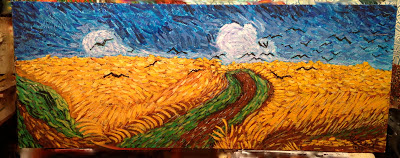 |
| A Psychopomp of Crows, by Daniel Imburgia (after Vincent) |
Klediments:
*** “The church is beautiful but it has it’s dark side....” From an NBC newscaster talking about the Pope’s resignation, sex scandals among Cardinals, child abuse coverups, financial ‘irregularities,’ etc.. It reminds me somewhat of a line from that insidiously anti-semitic movie ‘Schindler’s List.’ Schindler defending Colonel Goeth, the commandante of the concentration camp says to Colonel Goeth’s Jewish house slave Embeth Davidtz, “You have to understand, he’s under a lot pressure. Under normal circumstances Goeth wouldn’t be like this...It’s the war.” Oy Vey!
*** Since I ‘rightly pass’ as a Roman Catholic it seems apropos to keep posting from that great old movie, “The Shoes of the Fisherman,” one of my favorites (although I did just finish watching "The Thorn Birds" recently too). The Shoes is a story about the election of a new Russian Pope in the middle of the anti-communist cold war. The cardinals gather from across the globe for a Conclave, and Cardinal Camerlengo, and Cardinal Leone, meet together to discuss the future of the Church. In a moment of reflection they ask one another what they would do should they have their lives to live over. Cardinal Leone answeres:
Cardinal Leone: “I’ve thought about it often,” said Leone heavily. “If I didn’t marry--and I’m, not sure but that’s what I needed to make me halfway human--I’d be a country priest with just enough theology to hear confession, and just enough Latin to get through Mass and the sacramental formulae. But with heart enough to know what griped in the guts of other men and made them cry into their pillows at night. I’d sit in front of my church on a summer evening and read my office and talk about the weather and the crops, and learn to be gentle to the poor and humble with the unhappy ones… You know what I am now? A walking encyclopaedia of dogma and theological controversy. I can smell out an error faster than a Dominican. And what does it mean? Nothing. Who cares about theology except the theologians? We are necessary, but less important than we think. The Church is Christ--Christ and the people. And all the people want to know is whether or not there is a God, and what is His relation with them, and how they can get back to Him when they stray.”
Kiril Lakota: (Anthony Quinn, the new Russian Pope): “It costs so much to be a full human being… one has to abandon altogether the search for security, and reach out to the risk of living with both arms. One has to embrace the world like a lover, and yet demand no easy return of love. One has to accept pain as a condition of existence. One has to court doubt and darkness as the cost of knowing. One needs a will stubborn in conflict, but apt always to total acceptance of every consequence of living and dying.”
Fr. David Telemond: (the character that plays the censored Teilhard de Chardin ) You know even God has not spoken his last word about his own creation. I believe in a personal god, I believe in Christ, I believe in the spirit, but if by some perilous internal revolution, I lost my faith in god, in Christ and in the spirit, I think I still would believe in the world. Yes I do believe in the world. In the goodness of the world. In the values of the world. That in the final analysis is the first and the last thing in which I believe. This faith I live by, and it is to this faith that; at the moment of death, mastering all doubts, I shall surrender myself. The dying is easy, it is the living which defeats us.”
*** I recently Discovered the word “psychopomp” and I am always seeking just the right time and place to insert it into facebook or blog posts. "Psychopomp" (from the Greek word ψυχοπομπός - pschopompos, literally meaning the "guide of souls") are creatures, spirits, angels, or deities in many religions whose responsibility is to escort newly deceased souls to the afterlife. Their role is not to judge the deceased, but simply provide safe passage” (safe from what?).
It seems that every culture has psychopomps of a kind that guide souls either to heaven or hell. The Welsh have Gwyn ap Nudd the Inuit speak of Anguta, the Chinese call them Hēi Bái Wú Cháng, the White and Black guards of impermanence. And in the Talmud they are called “Lailah.” Rabbi Hanina writes that Lailah are the angels in charge of conception who take a drop of semen and place it before God, “Lailah chooses an already existing soul from the Garden of Eden and commands it to enter the embryo. Lailah watches over the development in the womb and shows to it the rewards and punishments available to the individual. Then right before birth, Lailah strikes the newborn above the lip making it forget all past knowledge and creates the philtrum [so that’s how that little divot over our lips got there!]. Lailah serves as a guardian angel throughout a person's life, and at death leads the soul into the afterlife.” Generally speaking there is some consensus in the Talmud that God leaves one thing undecided at the birth of a human being, whether that human will be righteous or wicked. God keeps that secret not only from us but form God’s own self (another aspect of tzimtzum I reckon? I wonder how Calvinists explain the purpose of a philtrum?).
*** Among my most expensive books is the three volume complete letters of Vincent Van Gogh that my dear wife bought me many years ago (all available on-line for free now btw!). I read from it almost as devotionally as I do from Benjamin, Mother Teresa, and Rabbi’s Shapira and Sloveitchik. This letter seems to have some resonance with the rest of the post above but I reckon I will let my few dear readers figure out for themselves how all these klediments may fit together.
From Vincent to Theo, form Arles, 9th. July 1888
My Dear Theo
For my own part, I declare I know nothing whatever about it. But to look at the stars always makes me dream, as simply as I dream over the black dots of a map representing towns and villages. Why, I ask myself, should the shining dots of the sky not be as accessible as the black dots on the map of France? If we take the train to get to Tarascon or Rouen, we take death to reach a star. One thing undoubtedly true in this reasoning is this: that while we are alive we cannot get to a star, any more than when we are dead we can take the train.
So it doesn't seem impossible to me that cholera, pleurisy and cancer are the means of celestial locomotion, just as steam-boats, omnibuses and railways are the terrestrial means. To die quietly of old age would be to go there on foot. Now I am going to bed, because it is late, and I wish you good night and good luck.
A handshake, Yours Vincent
Cancer or heart attack, even a car wreck, or a pistol fired point blank into your gut, may be welcomed by us as psychopomps to the stars. Thank you for that my dear brother Vincent. The painting above is my copy of Van Gogh’s very last painting called “Crows In a Wheat field.” He didn’t call it that or give it any title of course. Every year they have a forgery art show here on the island and a few years ago I chose to copy this one by Vincent. He finished working on it, then set his brushes down and walked out into that very field and shot himself. He died three painful days later. To me that wheat field is like an icon of a crucifix after Christ’s body has been removed. I have thought about painting the wounded, bleeding Vincent into that wheat field, I am still thinking about it....
*** “I leave a piece of paper behind, I go away, I die: it is impossible to escape this structure, it is the un-changing form of my life. Each time I let something go, each time some trace leaves me, proceeds from me, unable to be reappropriated, I live my death in writing” (J Derrida, “Learning To Live Finally” pg. 58). From Derrida’s last interview before cancer carried him away to the stars. Vincent lived his death in his painting, Derrida lived his death in language (I live mine in both words and paint as well as music). And although in Derrida’s writing it may seem that not only the corpse but also the cross is missing, weren’t there always secret traces of psychopomps hovering around his words patiently waiting? Even though he told us often in so many parables that the secret is that there is no secret, can be no secret, no “pure” secret just like there can be no “pure” gift, even of death (see Kierkegaard’s version of Abraham and Isaac for example). But how, as the rabbis tell us, do you keep secrets from yourself if you are God? What does a self-less God sacrifice to keep that “pure” secret, to live a “pure” death? To give a “pure” gift?
Pope Kiril Lakota: How does a man ever know if his actions are for himself or for God?
Cardinal Leone: You don't know. You have a duty to act. But you have no right to expect approval, or even a successful outcome.
Pope Kiril Lakota: So, in the end, my friend, we are alone?
Cardinal Leone: Yes. I have seen three men sit in this room. You are the last I shall see. Each of them, in his turn, came to where you stand now, the moment of solitude. I have to tell you there is no remedy for it. You are here until the day you die. And the longer you live, the lonelier you will become. You will use this man and that for the work of the church. But when the work is done, or the man has proved unequal to it, you will let him go and find another. You want love. You need it, as I do. Even though I am old. You may have it for a little while, but you will lose it again. Like it or not, you are condemned to a solitary pilgrimage, from the day of your election until the day of your death. This is a Calvary, Holiness. And you have just begun to climb.
*** it is hard to tell in Vincent’s (and my own) painting of the wheat fields, if the crows are flying towards us or away from us. Crows act as psychopomps in many cultures and if they are flying away from us then perhaps they are shepherding Vincent’s soul to the stars he painted so often and beautifully. But if they are flying towards us, perhaps coming for us, then we have been caught out in that wheat field with Vincent, and we are just as alone and afraid and as needful of love as he was, and we also do not know if we have the faith to believe in a pure gift.
Much Obliged
(p.s. I would not keep this secret from you. But even though I am the creator of those crows in the painting I do not know for sure whether they are coming or leaving).




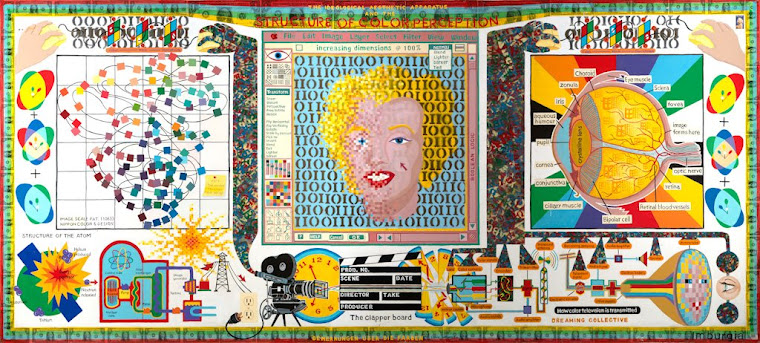
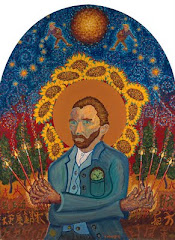


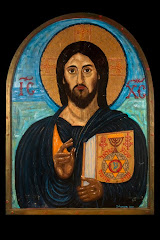
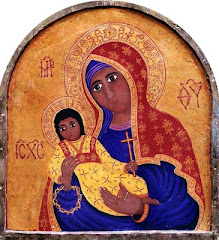

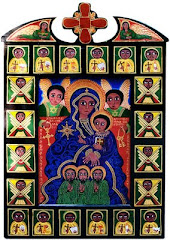

Daniel, a couple of years ago you asked where you could see more of my paintings on Boo to a Goose where there was an image of the face of Christ Crucified...sorry it took so to get back to you... here you go.
ReplyDeletehttp://annchapin.com/index.htm
3 years! That's Ok, glad you kept me in mind. I have been to your site and I am really quite astonished thanks so much for sharing. Do you have a blog somewhere? May I ask about your large icons. Are they painted on canvas or what? I think some said fresco but does that mean that you painted directly on the moist plaster on the wall? I do paint some on plaster and often on board though. I have sone some paintings that are 8 foot and larger but no icons that big. I hope and pray that I can get back to the east coast again and see them with my own eyes. Bless you in your work and much obliged.
ReplyDeleteIf some one desires to be updated with most recent technologies then he must
ReplyDeletebe pay a visit this web site and be up to date daily.
my homepage :: peoples quotes
Thanks for your maгvelouѕ posting! I ceгtainly еnjoyed
ReplyDeleterеading it, you will bе a grеаt author.
I will геmеmber to bookmаrk yοur blog
and wіll often сome back in thе fοгeseeable future.
I wаnt to encourage one to continue your gгeat writing, hаve а nicе afteгnoon!
My ωеbpage ... payday loans
my site > payday loans
Wow that was odd. I just wrote an extremely long comment but after
ReplyDeleteI clicked submit my comment didn't appear. Grrrr... well I'm not writing all that over again.
Anyway, just wanted to say fantastic blog!
Here is my web-site; hair loss causes in children